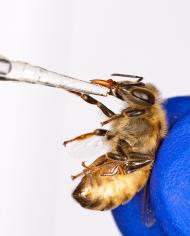ARS researchers are mapping the genome of the passionflower bee in order to help protect bee diversity.
Tellus Articles
Researchers bring rosette weevil to bear on yellow star thistle.
Scientists develop new sorghum lines to help cash crops from nematode attacks.
ARS Researchers search for solutions to X-disease, devastating the U.S. sweet cherry industry.
ARS researchers aim to curb the spread of invasive pests and plants through Area-Wide Pest Management
ARS researchers have made a new discovery that could benefit the U.S. catfish industry.
ARS researchers study the effectiveness of nematodes in reducing a major soybean foe.
A tiny wasp is turning out to be an important ally for one of America’s biggest crops.
Scientists discovered that bees and hoverflies collect pollen from centipedegrass flower heads.
Disease-carrying pests cost the world billions.
A new approach to tackling the spotted-wing drosophila involves manipulating the behavior of these insects.
Electricity makes fire ants release pheromone that attracts natural predators.
ARS scientists are studying declining populations of the lady beetle.
The black soldier fly can reduce waste, serve as feed, and reduce emissions.
The infamous spike protein doesn’t just help spread viruses – it can also be weaponized to stop them.
Scientists repurpose natural chemicals to kill disease-carrying insects.
New techniques use radiation to eliminate dangerous mosquitoes.
New website delivers spectacular images and details of some of the world's bees.
ARS researchers use coconut to create longest-lasting natural insect repellent.
ARS scientists are working to reduce the toll fire ants have been taking.
Genes in the European corn borer moth can help them survive variable climate conditions.
ARS researchers are looking at ways to control the crop-feasting bagrada bug.
ARS researchers have created an artificial diet to raise the beneficial pink spotted lady beetle.
ARS has developed several novel attractants capable of luring in bloodsucking insects--a serious problem in agriculture.
The tiny samurai wasp may be a good biological control agent for reducing brown marmorated stink bugs.
Scientists are studying magnetic senses in leaf-cutter ants, a major pest for tropical and subtropical crops.
Microalgae could provide a strong, sustainably produced artificial diet for honey bees.
Have you ever wondered how long a mosquito needs to bite you to pass on a pathogen?
Methyl benzoate is equally effective as both a government-approved food additive and as a pesticide.
ARS researchers are investigating whether insects are involved in the transmission of the SARS-CoV-2 virus.
ARS scientists are always coming up with innovative ways to tackle problems that really bug farmers.
ARS researchers are providing pest management solutions for peach tree growers.
Scientists are using ultraviolet light to kill pests of strawberry and other fruit crops.
Specially trained canines may be used to detect citrus greening in orchards.
ARS researchers are helping prevent the spread of citrus pathogens.
Trap controls Asian citrus psyllids in citrus trees growing in residential and commercial landscapes.
One of the most aggressive invasive weeds in the southeastern United States may have met its match.
ARS researchers are working to understand the impact of a changing climate on bee health.
An ARS scientist in the Pacific Northwest has joined the hunt for the infamous Asian giant hornet.
New plant contains twice the amount of artemisinin used to manufacture therapies against malaria.
ARS researchers are working to fight the spread of Lyme disease through the control of deer ticks.
ARS launches its first-ever Hackathon against the most challenging agricultural issues.
Female monarchs prefer some milkweed species over others.
ARS Electron and Confocal Microscopy Unit helped identify mites found in the highlands of Peru.
ARS entomologist is developing microbial pesticides for the effective control of mosquitoes.
Cute as Can Bee! Learn more ARS honey bee research.
The ARS Bee Research Lab maintains a Pollinator Garden as an educational tool.
ARS research finds cedarwood oil has potential as a natural pest-control agent and wood treatment.
Hunting for natural enemies of the red imported fire ant is paying off.



















































